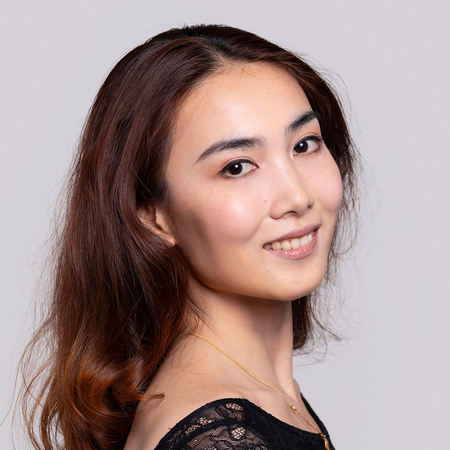Interview with Qian Liu: ‘Really! I’ve never talked so much in my life’
with Dutch National Ballet since 2012 and principal dancer with the company since 2016

Qian Liu, photo: Sacha Gouliaev
The Chinese dancer Qian Lui, now 33, was nine when she began her training at the Liaoning Ballet School in Shenyang, over 1500 kilometres from her parents’ home in Henan. But after almost 25 years of doing ballet day in, day out, she still sighs, “I simply love ballet”, and she knows that her future after her dancing career also lies in the ballet world. “I really want to become a teacher or ballet mistress, and for that I had to go back to the basics, so I registered for this Bachelor’s course.”
She is deliberately taking the course while still dancing full-time. “I want to be able to feel and experience everything I’m learning at the Dutch National Ballet Academy with my own body. And moreover, I’m benefiting enormously from this course as a dancer, too. Already, after just a few months, my view of the dancing profession and the way I think about it have changed so much. I owe that both to the wonderful teachers and to my fellow students: we all come from different backgrounds, which has really broadened my perspective.”
Individual approach
The Teacher of Classical Ballet course, says Qian, consists of five components: ballet methodology, music, pedagogy, anatomy and coaching. “I knew”, she says, “that teaching was a tough profession, but I hadn’t fully realised just how much it involved. For instance, ballet methodology has seven different levels, and each level has its own challenges. One of the things we learn is which teaching problems can arise at each level and how we can avoid them. Furthermore, my knowledge of music and my insight into what music fits which exercises have also increased enormously. And in the pedagogy lessons, we delve deep into what it means to be a good teacher. It’s not just about the steps and preparing your classes well, but also about the realisation that each student is different and therefore needs an individual approach. So having a detailed plan and setting clear goals are just part of the story. Empathy, insight and patience are certainly just as important, and so is leadership, because students need to know where they stand with you.” Fortunately, she says, a lot has changed since she started her dance training almost 25 years ago. “For us, then, it was just ballet, ballet and more ballet. We didn’t have any Pilates or PBT (Progressing Ballet Technique – ed.), and there were no lessons in eating healthily. It’s fantastic that we have all these resources nowadays. It makes it easier to determine what can benefit each individual student the most.”
Next level
At her ballet school in China, Qian was already known as being a hard worker, and nothing has changed in that respect since she’s been dancing with Dutch National Ballet. But taking a full-time Bachelor’s course at the same time as performing title roles in ballets like Giselle and Raymonda as a principal dancer is ‘next level’, she says. “There are some days, like during the performance series of Raymonda, when I start at half past eight in the morning at school and dance my last steps at eleven o’clock in the evening. It’s tough, but I love it,” she says airily. “What I do find very challenging is that I’m much more mentally active now – because you’re continually reflecting and analysing – and that I have to talk so much more. I’m a fairly quiet person by nature, and of course as a dancer you talk mainly through your body. But now I have to communicate with everyone: the pupils, the pianist, my fellow students and the teachers.” She laughs, “Really! I’ve never talked so much in my life.”
Click here for more information about the BA Teacher of Classical Ballet course.
For more information about Qian Liu, see: www.operaballet.nl/dansers/qian-liu

Qian Liu in 'Raymonda', photo: Sasha Gouliaev
